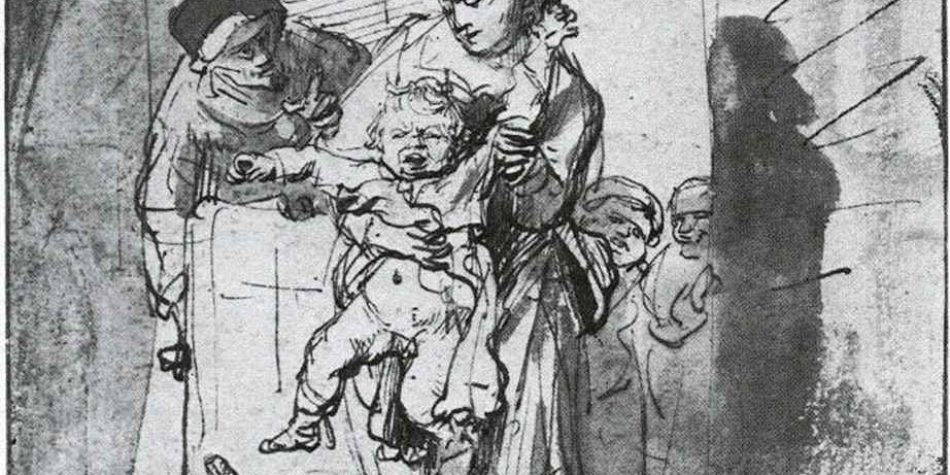Public Square has been publishing a series of essays this month to help us all prepare for a more meaningful, intentional Christmas. Even for those who aren’t sure what they believe about the Babe in Bethlehem, the holiday season still represents a time for giving, togetherness, stillness, and wonder. It’s as though we’ve undertaken a tacit agreement to lay aside our petty grievances and renew our commitment to living in love and peace with our fellow creatures.
This week is also the darkest time of the year—a fitting background for Christmas, actually. It reminds us why we all need the light so much. A warm fire is never so miraculous as on a cold, dark night. We could all probably agree that our cultural atmosphere has become a bit too dark and too cold of late and we’re aching for sincerity, understanding, and generosity.
In this moment of great need, what is being shared with the hungry masses?
More anger. More reasons for fear and despair. And more accusation.
Have you heard the latest headline news? A tech entrepreneur, Jeff Green, has decided to formally and publicly withdraw his membership from The Church of Jesus Christ of Latter-day Saints. By his own account, he has not been active for many years and takes issue with the Church over various social and historical issues. Normally, leaving the Church is not newsworthy, but Green’s enormous wealth creates a news angle too good to pass up when he accuses the Church of exploiting its members to build cattle ranches and shopping malls. In this way, an event that would normally be privately tragic but publicly unremarkable has been featured in major national and international media outlets.
We have no desire to weigh in on Green’s sincerity or the nature of his interactions with other members of the Church. We don’t agree with him that the Church is “actively and currently doing harm in the world,” but good people can differ there—we all tally such ledgers differently. However, the way these experiences are represented in the media really does matter, and minimizing one side of the ledger shapes public conversation in one specific way. In this case, Green advances a withering critique of the Church, with the outlets amplifying it offering no counterbalancing facts or voices.
This one-sided reporting is part of a pattern that has been regularly repeated in national publications. The media coverage of Green’s acrimonious claims tacitly endorses his sentiment by featuring only the perspectives of Green and a handful of progressive former and current Church members who are largely in political and theological lockstep. In a church of 16 million members, with over 2 million in Utah alone, there are a variety of published, respected, prominent members of the Church who could have easily offered a balancing view. Instead, we’re led to believe that, if not for the Church’s draconian leadership and the unenlightened membership under it’s thumb, all would be well in a sexually progressive Zion. Journalists should know better than to purvey polite bigotry by painting a major faith community and its leaders in such a blanket manner.
Part of what gives Green’s story mass appeal is that it serves an exciting narrative that speaks to our cultural moment. We’re disposed to take our moral cues from powerful stories with cleanly divided, readily ascertainable good guys and bad guys. It’s a tale that’s as simplistic as it is misleading: “heroic rebel leaves evil church that makes trillions off of poor saints in developing nations.” Context, qualifications, and even facts matter little because a powerful narrative can generate a great deal of sincere conviction without appeal to any of these things.
And because these stories operate primarily on our emotions, rather than our conscious reasoning, they’re extremely effective at shifting our values without our notice. In this way, we often accept the messages they contain with very little rational scrutiny. Once the heart is engaged, it will marshal whatever else it needs to convince the mind. And probably reject the rest.
Consistently, those eager to embrace the narrative of church-induced harm Mr. Green advances are likely discounting a whole set of other facts, across a variety of other areas. For instance, in one year alone, the Church has brought about:
- 400,000 food orders given out to hungry individuals
- 300,000 people in 35 countries receiving vision care
- 50,000 people in dozens of countries receiving wheelchairs
- Thousands of mothers in 39 countries receiving newborn care
- Over 100 disaster-relief projects around the world helping victims of hurricanes, fires, floods, earthquakes, and other calamities
American Latter-day Saints perform nine times more hours of service monthly than others in the U.S., graduate from college at a higher rate than the national average, and Utah has the nation’s lowest levels of alcohol consumption and binge drinking. There’s also research from UCLA showing that active Latter-day Saint women and men live 5-10 years longer on average.
Does this sound like an organization doing great harm in the world?
Additionally, the Church has championed LGBTQ rights against housing and employment discrimination, while, of course, seeking protections that allow it to pursue it’s particular vision for human fulfillment.
And of the Church’s concerted efforts at combating racism, Rev. Amos C. Brown of the NAACP has said “I thank God that God enabled me at the age of 80 to stand here for this historic moment to say to America, ‘Look at The Church of Jesus Christ of Latter-day Saints, look at the NAACP,’ for if you take what they use of love, civility, justice and peace, you won’t lose.”
While it’s true the Church has large financial holdings and investments, the money is not used for anyone’s personal enrichment. The Church has an inscrutable track record of providing sustainable paths to self-sufficiency through financial assistance and education. With Brother Michael Peterson, we are also “profoundly grateful that our Church has significant reserve funds to maintain its independence now and in the future, enabling it to provide for the maintenance and support of a growing global faith and its mission.” We also agree that considering future uncertainties—witness Covid and its variants and other global financial insecurities staring us in the face—there is wisdom behind our leadership preparing for future difficulties. We are encouraged by it.
There are many more similar examples of service, relief, outreach, and financial aid conspicuously absent from recent media accounts about a Church “actively harming the world.” But these are discounted because Jeff Green and his media supporters have a very different vision for what constitutes helping the world. As a result, Green lambastes the Church over it’s particular stance on a few particular issues largely limited to the LGBTQ community. Yet even there, the Church has repeatedly emphasized its support for this community while maintaining the belief that heterosexual marriage is most conducive to maximal human happiness. In the same moment, the Church has also fed the hungry, stabilized families, healed the sick, and, most importantly, helped millions of people—by their own account—to find profound and lasting meaning in their lives.
Our hearts go out to those who allow themselves to drift away. Many come back, and all will be welcomed if they choose to return. In the meanwhile, the Church will press on, no doubt continuing to feel the cultural squeeze to adopt secular ideologies so prevalent today. But that’s a good sign. After all, The Church of Jesus Christ of Latter-day Saints is committed to a vision for mankind that will frequently depart from popular narratives.
We are witnessing in real-time two competing visions of salvation. On the one hand, you may believe that the Church needs Mr. Green’s money and that a wealthy tech entrepreneur is better able to identify and remedy the real sources of the world’s hurts. Of course, he can use his resources in whatever ways he wishes. But consider that when God wanted to save his people, he sent a poor, obscure baby into the world. His ways don’t always make sense initially, but for those who are patient, the little star in Bethlehem becomes the full, resplendent dawn of Easter morning. His Church, too, has come a long way from its humble beginnings, but it evinces the same dedication to the dignity of individuals in a variety of circumstances—not just those whom the Jeff Greens of the world champion. To which of these visions do you personally feel called?
In this week and always, what we will continue to anguish about most is hearts being hardened and turned against each other and the message of Christ as a whole. In the very moment when we need reconciliation the most, unfortunately front-page headline articles like Mr. Green’s exacerbate our sense of division and hostility. They generate even more suspicion. And stereotyping. And unnecessary outrage.
Thank God for sending his Son to show us something far better. As Isaiah beautifully forecasted, “The people that walked in darkness have seen a great light.” May that “great light” find all of us this week—all who would receive Him—even and especially in the mounting darkness and bitter gloom around us.
Merry Christmas to all.
Editor’s Note: Check out some other thoughtful responses from Ben Pacini and Michael Peterson here.



















